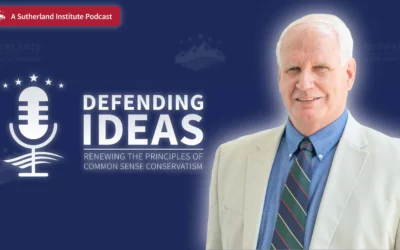
Written by Christine Cooke Fairbanks
August 3, 2023
Originally published in Utah Policy.
Rep. Chris Stewart is set to leave Congress soon. Whoever takes his place will inevitably be asked how he or she can fix problems in education.
This will offer the new member of Congress the chance to pursue the path of principle and resist the easy (and polarizing) path of making promises that would mean expanding or encouraging federal power. Instead of promoting national solutions to local problems in education, the members of Utah’s congressional delegation should commit to pivoting education controversies back to the states for resolution.
Recent Gallup polls show that Congress, once again, has a low approval rating (19%) and that American confidence in the institution is incredibly low (8%). Last year, polarization in Congress hit a five-decade high, meaning Republican and Democrat members are ideologically further apart than ever. These two outcomes are likely connected.
Because Congress has been turned by many elected officials into a platform for personal political performance – a place to expand a social media following, raise money and grow name identification rather than to govern – Congress polarizes nearly everything it touches. The federal government generally also lacks a sustained track record of success in improving education outcomes. These are solid practical reasons why Congress should not get more involved in education.
Further, on the level of principle, education is an issue over which Congress has no explicit constitutional authority. As Thomas Jefferson once said, “The government closest to the people serves the people best.”
Still, since about the 1960s, Congress and the federal government have increasingly intervened in education policy – with few gains for students. That is because Congress was not built to legislate bold reforms on the education minutiae that impact the one-on-one interactions between students, teachers and parents.
Arguably, the biggest widespread congressional reform since 1965 – No Child Left Behind Act (NCLB) and its follow-up legislation – showcases the problems that arise from congressional attempts to govern education.
NCLB requirements and sanctions were untenable when it came to real-life implementation. Things like requiring 100% proficiency in certain tested subjects by 2013-14, demanding open enrollment to higher performing schools when students attended low-performing schools, or mandating turnaround strategies for schools were frustrating to educators and families alike.
The federal government doubled down on NCLB angst with more federal policies. First, in 2009, the Obama administration pushed Race to the Top to give states more money during the recession. This grant program incentivized the highly unpopular Common Core Standards. A couple of years later, the administration also created NCLB waivers, which pushed reforms like evaluating teachers based on test scores. Even the Every Student Succeeds Act passed in 2015 (the successor to NCLB), which gave far more flexibility to states, reinforced a centralized federal role over education by requiring approval of state plans by the federal Department of Education and kept accountability at the federal level. Importantly, the original hopes of NCLB – to significantly increase student achievement or close achievement gaps – were not realized long term.
Utah’s new member of Congress – and every member of Utah’s congressional delegation, for that matter – should take note that most positive, impactful education reforms have come from states, districts, educators and families. Whether making use of charter schools, education choice (especially since the pandemic), or measures to close racial gaps in high school graduation rates, state policymakers and local education leaders have often been keenly aware of their own needs and, unlike Congress, nimble enough to do something bold or significant about it.
States cannot get everything correct in education, of course. States can face polarization, gridlock and bad ideas. And violations of equal access can be addressed at the federal level where it has a clearer role. But as a rule, in education policy, Congress should leave power with state and local leaders free of undue bureaucratic burdens.
Utah’s delegation can keep looking for ways to free up federal funds in existing policies to be used in more creative or flexible ways, like the proposal to create scholarshipsto overcome pandemic learning loss. Likewise, Congress can expand flexible uses of public funds intended to benefit low-income families so they can choose for themselves how to help their students. The proposal to loosen federal restrictionson the allowable uses of savings in 529 accounts is another constructive policy idea.
Utah’s congressional delegation should continue legislating in policy areas enumerated by the Constitution – which does not include education. If we want to improve outcomes for students, our federal leaders should pursue principle and recognize their practical limits, rather than failing students while expanding federal power.
More Insights
Read More
Protecting property rights against government overreach
While governments can continue to regulate land use, these regulations and fees must be justified by a government interest and proportional to the effect of the development’s impact on that interest.
Do we need to care about the Utah State Board of Education?
For any Utah voters who also feel like K-12 public education is headed in the wrong direction, learning about the candidates running for a seat on the Utah State Board of Education (USBE) is a wise choice this election season.
Defending education choice the right way
Education choice has exploded in popularity across the nation in recent years. So why does it remain a contentious point of debate in some parts of the country?


